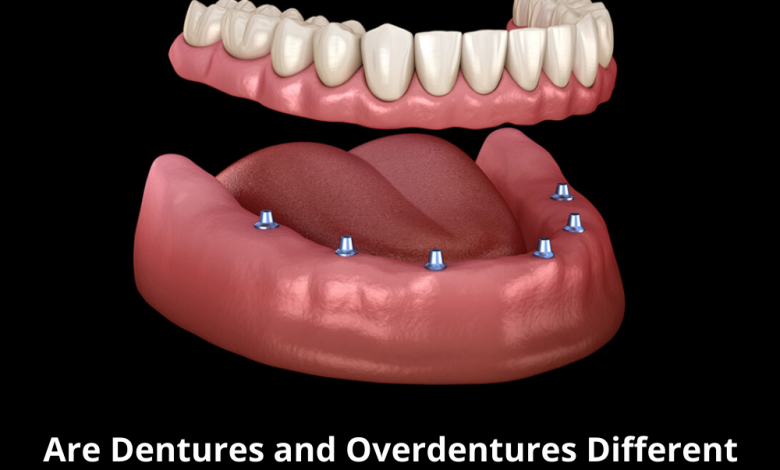Are Dentures and Overdentures Different Treatments?

Dentures, missing teeth or no teeth- when we hear any of these words, the first thing that probably comes to mind is that dentures are only for seniors. Or, for those of us approaching middle age, we shudder at the prospect of ever needing them. The reality, on the other hand, is quite different.
According to the American College of Prosthodontists, over 36 million people lack teeth, and approximately 100 million people have at least one missing tooth.
These figures are expected to increase as the population ages over two decades.
Thus, anyone can need dentures. A denture is a set of teeth embedded in pink plastic-type material. However, this is not fully true. There are numerous types of dentures available, and it can be difficult to determine which one is best for your mouth.
If you’re having difficulty understanding the various denture options, you’ve come to the right place. Simply put, dentures are useful to replace missing teeth. They are useful to fill in gaps left by missing teeth and they have a broad classification as:
- Dentures are famous for its complete dentures when they work magically to replace an entire set of teeth.
- When one or more false teeth are needed to bridge gaps in your natural teeth, it’s called Partial Denture.
How Can Modern Dentistry Help You?
Besides that, modern dentistry provides you with more options than ever before if you are missing teeth. There is the option of conventional dentures (removable) vs dentures (overdentures) with implant-support.
Understanding the critical distinctions between them can be confusing with so many options. Dentures are still useful to treat tooth loss, but there are now special types of dentures called overdentures that incorporate cutting-edge dental implant technology. So, yes, dentures and overdentures are different treatments.
Many people want to go for dentures in Calgary but are confused between dentures and overdentures. Here’s how traditional dentures and overdentures differ so you can make an informed decision about your care.
Dentures
Dentures in the traditional sense are made up of artificial teeth mounted in an acrylic base that resembles gums. Adhesives, natural suction, or both are used to secure dentures.
From the outside, overdentures resemble conventional dentures, but they have protection in your mouth via clipping or screwing onto titanium dental implants placed in your jawbone. Overdentures are more stable because they attach to a solid foundation in the form of dental implants.
Bone loss
Bone loss is more common in traditional dentures in comparison to overdenture. Of course, the main reason for bone loss is age, but overdenture can reduce the rate of bone resorption.
Overdentures direct the force of your bite away from your false teeth and into the bone of your jaw. Receiving this sensation from the implants instructs your jaw to continue producing new bone, preventing the bone structure beneath your overdentures from deteriorating.
Bone Shrinkage
The bone shrinkage referred to as “resorption” is more likely to occur with conventional dentures because of no solid structure between the denture and the bone, informing the bone that it is still being used to bite. Jaw bone resorption eventually causes traditional dentures to fit poorly and require adjustment.
It can result in your cheeks appearing sunken and aged as your bone structure shrinks. However, this resorption process takes years, and one can overcome that by changing dentures at a certain point.
Permanente Dentures
One of the most significant benefits of getting permanent dentures is improved eating experience and nutrition. Conventional dentures can impair your ability to taste because they cover the palate (roof of your mouth), which contains some of your taste buds.
Overdentures do not cover the palate. Overdentures can chew foods that you would have had to avoid (or cut up before eating) if you had unstable conventional dentures or missing teeth, such as meats or crunchy vegetables.
Additionally, speaking becomes easier with secure overdentures. Your speech will be clearer in general, particularly the letters “s” and “f,” which can become muddled or lisped when wearing conventional dentures covering your palate. But, such a speaking problem is easily solvable by practice. Constant speaking practice is necessary after you wear a traditional denture. Within a week or two, you can speak words effortlessly.
Conventional Dentures
One potential advantage of conventional dentures is that they are initially less expensive than overdentures, as they do not require implant placement.
However, the adjustments or replacements associated with traditional dentures may accumulate over time. Overdentures are much less likely to encounter these issues, so that the initial investment may save you money.
Bottom line
Now that you are aware of the difference between dentures and overdentures. Dentures and overdentures are real and viable options and you should not view them with suspicion. According to your choice, you can opt for any treatment. Of course, dentures that have implant-support are the best, but regular dentures are also a good option.
Having several missing teeth or none can present difficult and confidence-sapping situations that collectively reduce your life’s quality. As you lose more teeth, it becomes increasingly difficult to perform basic daily functions such as eating and speaking (and smiling and singing).
Additionally, missing teeth can significantly impact a person’s confidence, healthy psychology, and even their face shape. A person’s smile is one of the first things we notice.
Consider how it feels to be unable to smile confidently at a loved one or avoid social situations due to missing teeth and the associated struggles. So, do not wait; visit the dental clinic in Calgary and ask for the denture option you want. Also, you can read about skin care tips.



![Photo of [#pvp@tv] Brazil vs Japan Women volleyball Live free volleyball FIVB Volleyball 2022 Women’s World Championship Quarter-final](https://blogspinners.com/wp-content/uploads/2022/10/bpfqnvwey1e71-390x220.webp)

